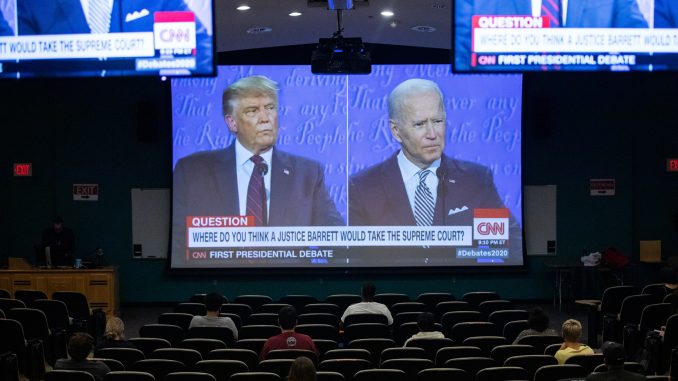
David Mindich has hosted gatherings for his students to watch and discuss presidential debates since former President George W. Bush and former Vice President Al Gore first squared off in 2000.
“Every election is important,” said Mindich, chair of Temple University’s journalism department. “It’s always more fun, interesting and educational to watch with a group because you get to hear everyone’s reactions, and then you can talk it through.”
Keeping this tradition alive, Mindich gathered a group of around 25 students in Anderson Hall to watch the first presidential debate of the 2020 general election between President Donald Trump and former Vice President Joe Biden Tuesday night.
“It’s interesting especially to watch it with other people because you can get other perspectives, maybe some discourse,” said Charlotte Hobbs, a freshman communications major in Mindich’s Journalism and Society class. “I feel like I can get a lot out of talking it over with someone instead of just watching.”
Like Hobbs, many of the students in attendance were enrolled in Mindich’s Journalism and Society class. However, the watch party was open to students of all majors as long as they wore masks and practiced social distancing.
“Being able to be with a group of people who represent a community regardless of political ideology, you can’t replace that,” said David Brown, a public relations professor who also attended the event. “Honestly, this is probably one of the most important elections in our generation for us to be with our students.”
Tuesday night’s debate was marked by constant interruptions, personal insults and sharp criticism levied by each candidate, with Biden telling Trump to “shut up” and Trump combatting both Biden and debate moderator Chris Wallace, a Fox News anchor. Students laughed at candidates’ punchy one liners as they watched the debate on multiple screens spread throughout the lecture hall.
Joe Habersham, a freshman journalism major who is voting for the first time this election, liked that the watch party gave him an opportunity to observe each candidate, he said.
“Growing up in Philadelphia, being such a Democratic area, I don’t really have the chance to look at Republicans like this,” Habersham said. “It seems like it’s really a battlefield on the stage.”
Max McLaughlin, a freshman journalism major, also attended the event to learn more about the candidates, but thought the debate was “chaotic,” he said.
“This is way more than I thought it was going to be,” McLaughlin said. “I feel kind of bad for the moderator because he developed all these questions and all that, and they’re going really off-topic all the time.”
Wallace asked the candidates questions about the Supreme Court of the United States, the COVID-19 pandemic, racism and violence, the economy, the environment, the candidates’ records and the integrity of the election.
Students attending the watch party said these issues were ones they wanted to see addressed Tuesday night.
“Coming from all the events that occurred this summer, it’s definitely racial injustice for me, just because that’s mostly what I care about,” said Alyssa Threadgill, a freshman journalism major. “And I care about climate change, and basically how COVID’s being handled because my freshman year has been very strange, and it’s not ideal at all.”
Like Threadgill, Julia Merola, a freshman journalism major, hoped the candidates would discuss the Black Lives Matter movement, environmental policies and women’s rights. Additionally, Merola wanted to see the candidates discuss the New York Times report that found Trump paid only $750 in federal income tax in both 2016 and 2017, she said before the debate began.
“It was really frustrating to see because at 16 years old, I was paying more taxes than our president,” Merola said.
Before the debate, Mindich encouraged students to pay attention to the candidates’ policies, the way they verbally and physically interacted and qualities like their empathy, mental acuity and fitness for office.
Mara Tannenbaum, a freshman journalism major, said empathy is one of the qualities she is looking for in a presidential candidate.
“Open-minded, sympathetic, open ears willing to listen, more willing to make changes,” Tannenbaum said, listing the traits she would ideally like to see in a presidential candidate.
Mindich is unsure if he will hold another debate watch party this semester, he said. The next debate will take place on Oct. 7 at 9 p.m. EST between Vice President Mike Pence and Sen. Kamala Harris, Biden’s running mate.







Be the first to comment